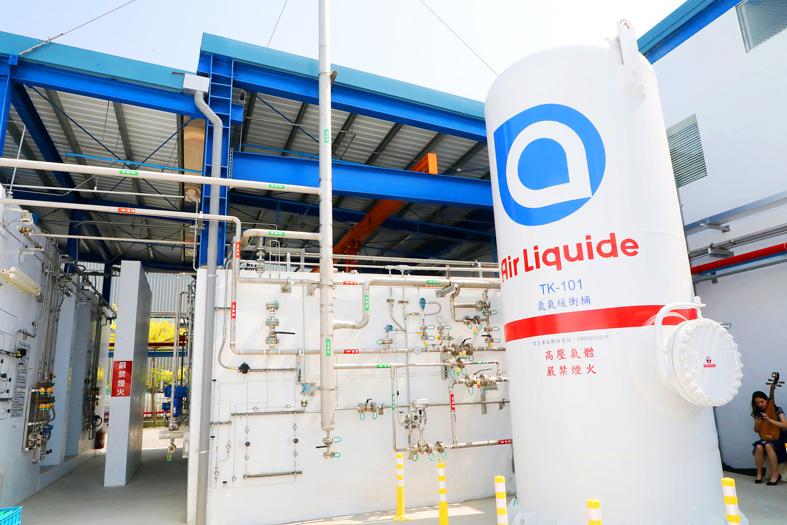Air Liquide Far Eastern Ltd’s (ALFE, 亞東工業氣體) 25-megawatt ultra-pure, low-carbon hydrogen electrolyzer plant yesterday began operations at the Tainan Technology Industrial Park (台南科技工業區), with the aim of supplying hydrogen gas to the park’s semiconductor manufacturers.
Speaking at the opening ceremony, Tainan Mayor Huang Wei-che (黃偉哲) said that the plant would not only aid the development of the nation’s semiconductor industry, but also open the door to “green hydrogen” applications.
“This is the world’s first ultra-pure, low-carbon hydrogen electrolyzer plant,” Huang said. “It will support the development of all sorts of potential hydrogen applications in Taiwan.”

Photo courtesy of Tainan City Government via CNA
“This project illustrates the investment opportunities that exist in Taiwan for foreign businesses,” he added.
Air Liquide said the traditional method for reducing hydrogen from methane, or steam-methane reforming, is cheap, but highly polluting.
However, the electrolyzer technology employed by Air Liquide produces highly pure hydrogen without any carbon dioxide.
Compared with a traditional plant, the new plant would reduce carbon dioxide emissions by 35,000 tonnes per year — equivalent to how much carbon is absorbed by 1 million trees per year.
ALFE is a joint venture between France’s Air Liquide SA and Far Eastern New Century Group (遠東新世紀集團).
Air Liquide is the world’s leading producer of high purity industrial gases.
In addition to the hydrogen plant in Tainan, the company is building a NT$4 billion (US$141.3 million) facility at the Hsinchu Science Park (新竹科學園區) to produce highly pure industrial gases for the semiconductor industry.

Hon Hai Precision Industry Co (鴻海精密) yesterday said that its research institute has launched its first advanced artificial intelligence (AI) large language model (LLM) using traditional Chinese, with technology assistance from Nvidia Corp. Hon Hai, also known as Foxconn Technology Group (富士康科技集團), said the LLM, FoxBrain, is expected to improve its data analysis capabilities for smart manufacturing, and electric vehicle and smart city development. An LLM is a type of AI trained on vast amounts of text data and uses deep learning techniques, particularly neural networks, to process and generate language. They are essential for building and improving AI-powered servers. Nvidia provided assistance

DOMESTIC SUPPLY: The probe comes as Donald Trump has called for the repeal of the US$52.7 billion CHIPS and Science Act, which the US Congress passed in 2022 The Office of the US Trade Representative is to hold a hearing tomorrow into older Chinese-made “legacy” semiconductors that could heap more US tariffs on chips from China that power everyday goods from cars to washing machines to telecoms equipment. The probe, which began during former US president Joe Biden’s tenure in December last year, aims to protect US and other semiconductor producers from China’s massive state-driven buildup of domestic chip supply. A 50 percent US tariff on Chinese semiconductors began on Jan. 1. Legacy chips use older manufacturing processes introduced more than a decade ago and are often far simpler than

STILL HOPEFUL: Delayed payment of NT$5.35 billion from an Indian server client sent its earnings plunging last year, but the firm expects a gradual pickup ahead Asustek Computer Inc (華碩), the world’s No. 5 PC vendor, yesterday reported an 87 percent slump in net profit for last year, dragged by a massive overdue payment from an Indian cloud service provider. The Indian customer has delayed payment totaling NT$5.35 billion (US$162.7 million), Asustek chief financial officer Nick Wu (吳長榮) told an online earnings conference. Asustek shipped servers to India between April and June last year. The customer told Asustek that it is launching multiple fundraising projects and expected to repay the debt in the short term, Wu said. The Indian customer accounted for less than 10 percent to Asustek’s

Gasoline and diesel prices this week are to decrease NT$0.5 and NT$1 per liter respectively as international crude prices continued to fall last week, CPC Corp, Taiwan (CPC, 台灣中油) and Formosa Petrochemical Corp (台塑石化) said yesterday. Effective today, gasoline prices at CPC and Formosa stations are to decrease to NT$29.2, NT$30.7 and NT$32.7 per liter for 92, 95 and 98-octane unleaded gasoline respectively, while premium diesel is to cost NT$27.9 per liter at CPC stations and NT$27.7 at Formosa pumps, the companies said in separate statements. Global crude oil prices dropped last week after the eight OPEC+ members said they would